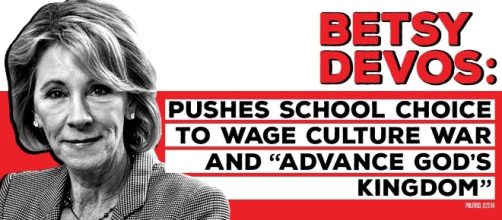During an annual conference called The Gathering, where the wealthiest Christians in the US come together and talk about religion and policy, education secretary Betsy DeVos was quoted as saying “our desire is to be in that Shephelah, and to confront the culture in which we all live today in ways that will continue to help advance God’s Kingdom, but not to stay in our own faith territory."
Critics claim her religious and educational agenda challenges the constitutional separation of church and state, a bedrock of American democracy. Although the separation of church and state isn't specifically written in the Constitution, it has been upheld by the Supreme Court, the highest court in the country.
Constitutional Rulings and the Supreme Court
Many constitutional rulings, such as Everson v. Board of Education, explain how “the clause against establishment of religion by law was intended to erect ‘a wall of #separation between Church and State.’”
In Everson v. Board of Education, Justice Hugo Black held: "The "establishment of religion" clause of the First Amendment means at least this: Neither a state nor the federal government can set up a church. Neither can pass laws which aid one religion, aid all religions, or prefer one religion over another."
Critics fear this is what DeVos would potentially be doing if she implemented or lobbied for policy that funded only some religious schools or educational institutions at the expense of public schools.

